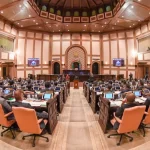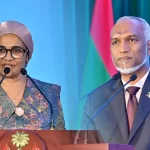In the aftermath of the Maldives’ recent parliamentary election, where 93 seats were at stake, a tapestry of familial bonds, corporate affiliations, and voter sentiments towards ongoing development initiatives has emerged as defining features of the electoral landscape.
A notable absence from the election results was any triumph for the Democrats, a splinter group from the opposition Maldivian Democratic Party (MDP), signaling a significant setback for dissenting voices within the nation’s political milieu.
Among the victors, the emergence of three female candidates, one running independently and two representing the ruling Progressive National Congress (PNC), highlights the ongoing struggle for gender parity in Maldivian governance. This achievement stands stark against the backdrop of the limited representation of women in key decision-making bodies, with the cabinet of President Dr. Muizzu boasting a mere 13 percent female composition and the Majlis, a mere three percent.
The pervasive influence of familial connections to the presidency was evident in the election outcomes, with both the half-sister and cousin of the incumbent president securing parliamentary seats. This dynastic presence underscores the intricate interplay between kinship and political power dynamics in the Maldives.
Further entwining the realms of politics and personal relationships, the successful bids of two ministers’ fathers for parliamentary seats underscore the enduring clout of political lineages in shaping the nation’s electoral landscape.
In addition to familial ties, the election results reflect a notable sway of business interests, with individuals affiliated with the nation’s core business entities securing parliamentary seats. This symbiotic relationship underscores the intricate nexus between political governance and commercial interests in the Maldives.
A key narrative of the election lies in the triumph of candidates advocating for continuity in government policies and development agendas. According to a survey conducted by TruthMV across 50 constituencies during the election, a significant portion of respondents expressed a desire to uphold the government’s efforts towards furthering developmental initiatives. Holding the government accountable for its actions ranked low on the list of priorities for many voters, signaling a preference for stability and progress over political upheaval.
As the newly elected parliamentarians prepare to assume their roles, the focus now shifts towards the implementation of policies that address the aspirations and concerns of the Maldivian populace, against the backdrop of familial legacies, corporate interests, and the electorate’s call for continued progress.












